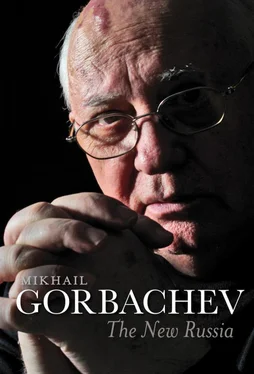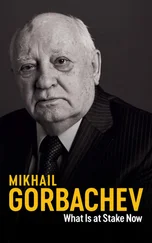AFTER PERESTROIKA
The 1990s: Defending Perestroika
What is it like when, after fate has raised you to leadership of a superpower, you find yourself in the kind of situation I was in during the first months of 1992? Not much fun, I can tell you.
My last month as president was tense and dramatic, but I continued doing all I could to keep open the prospect of renewal of the Soviet Union, and of cooperation and continuing ties between the former Soviet republics, which by then were already independent states. I did not cling to power at all costs, power for its own sake.
It was a bitter blow that Perestroika had been halted halfway, indeed when it was still only beginning. Already I was aware of just how deeply rooted the legacy of totalitarianism was, in our traditions, in people’s mindset and morality. It had seeped into almost every pore of the social organism. That deeply troubled me in those days and, more than 20 years later, still does.
My last day in the Kremlin
On 26 December 1991 I arrived at my office in the Kremlin, having agreed with Boris Yeltsin that I would vacate it by 30 December. There were papers and personal possessions to be sorted, but I was primarily interested in the responses coming in from different parts of the country to my announcement that I was standing down as president. I looked through the newspapers and letters and telegrams from Soviet citizens. Most were sympathetic and wishing me well, although there were others. The machinery of slander and lies was already grinding away on the subject of supposed Swiss bank accounts and villas abroad. It struck me that many people did not yet know they were being deprived of their country.
Here is a summary of those first telegrams and the reactions reported to me.
Most correspondents could understand the reasons for my decision. Many wrote appreciatively that they had been freed from the threat of nuclear war, from fear of a tyrannical government. They were thankful for the breakthrough to democratization and freedom and hoped I would soon return to national politics. There were calls for leaders of the former Soviet republics to ‘find a job worthy of Gorbachev’, many good wishes for the New Year, for good health, ‘inner peace’, and invitations to come with my family to visit.
Other telegrams criticized my decision because ‘the process of Perestroika is not yet complete’. There were doubts that the Commonwealth of Independent States would prove capable of uniting the peoples incorporated in the Soviet Union, of guaranteeing harmonious relations and genuine equality and making life better for them. There was much criticism that decisions about establishing the CIS had been taken in haste and were of dubious legality. Some hoped I would support the Commonwealth, or at least not try to hinder it. There were also accusations that I had caused the break-up of the country and wrecked the economy.
People wrote about the lack of bread, milk and other food supplies in the provinces for weeks at a time; about having to queue for hours in shops; about inadequate preparation being made for the winter; interruptions in the supply of electricity, fuel and heat; about how cold it was in their apartments. There were desperate pleas for urgently needed medicines and complaints about shortages of them. People wrote of the importance of paying urgent attention to the situation of troops in the former Soviet republics, and the social welfare of servicemen. Several correspondents urged me to appeal for support to the army, whose job it was ‘not only to defend the state, but the lives of all the people’.
I signed photos for the closest members of my staff, adding a message: ‘We have made a start, life goes on, and anyone who thinks the Gorbachev Era is over had better think again. This is only the beginning.’
While I was going through the mail, Raisa called in some distress to say the managers sent by Yeltsin’s administration were demanding we should move out of the presidential apartment in Moscow as well as the official country residence, while refusing to provide transport for the removal. I had to put the overzealous commandants in their place in a stoutly man-to-man and Russian manner.
I recently found the following note in my archive:
Privatization of Apartment
M. S. Gorbachev and R. M. Gorbacheva on 28 December 1991 have concluded this agreement with the Committee on Housing Policy of Moscow City Council whereby in accordance with Article 7 of the Law on Privatization of the Housing Stock of the RSFSR they have each and severally acquired rights of ownership to an apartment occupied by them on Kosygin Street which has a total usable area of 140 (one hundred and forty) m 2, of which the residential area comprises 65.1 (sixty-five point one) m 2. Citizens M. S. Gorbachev and R. M. Gorbacheva will service and maintain the privatized apartment at their own expense. The apartment was previously occupied by members of the bodyguard of the president of the USSR.
The woman notarizing a copy of the privatization contract on 29 December 1991 asked my assistant in surprise: ‘Is it really true that this extremely modest apartment is all the Gorbachevs now own?’
The presidential apartment we had been living in and were required to vacate with such urgency was, I heard, looked over by Yeltsin, but he did not care for it. With the approval of the new authorities, it was subsequently sold and resold several times.
That same day I gave the first interview since my resignation to Italian journalists from La Stampa and Repubblica. To their first question, ‘How are you feeling?’ I replied: ‘Once a decision has been taken, one usually feels better. Changes in my living conditions do not trouble me. My family and I are not being spoiled.’ Giulietto Chiesa, the correspondent from La Stampa , took the opportunity to ask some broader questions.
Q: Do you still call yourself a socialist? Do you think socialism is still a credible project?
A: It is not socialism that has been defeated but Stalinism disguised as socialism. What has been defeated is a model that levelled everything down and ruled out innovation. I feel that what I participate in is, on the contrary, a collective search for justice, freedom and democracy. Mankind will continue that search, as do movements professing a wide variety of ideals.
Q: You sound like Sakharov.
A: Yes, the theory that the communist and capitalist worlds are converging… The thought and moral authority of people like Sakharov is very important to me.
Q: Are you feeling safe? Are you not afraid you may be used as a scapegoat if things go wrong?
A: That has happened often enough in the past. When politicians in power suffer reverses or find themselves unable to control the situation, they try to divert their citizens’ attention to other problems and energetically seek someone to blame for their own mistakes. Nothing can be ruled out.
Russian and foreign journalists were interested to know whether I was planning to lead the opposition. I could see no justification for joining it, neither from a political point of view nor from that of the country’s interests. It was out of the question that Gorbachev might oppose the policy of reform in Russia. I said I might offer advice, express my opinion, but I supported the basic direction of the reforms and declared that we should support Russia’s leaders.
‘I cannot even imagine going over to the opposition. Opposition to what? Democratic reforms? Opposition to myself? That is not the kind of person Gorbachev is, as everyone well knows.’ I repeated that in almost all the interviews I gave in my last weeks as president, and said the same thing to Yeltsin.
Читать дальше












